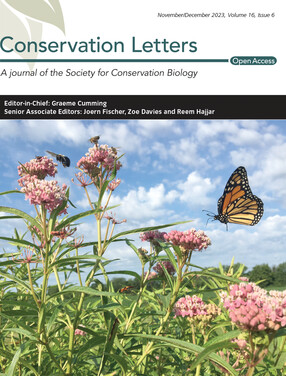“Walk the Land, Before You Talk About the Land”: TEK‐Based Conservation Monitoring Invalidates Caribou Extirpation Status Assigned by British Columbia and Canada
IF 7.7
1区 环境科学与生态学
Q1 BIODIVERSITY CONSERVATION
引用次数: 0
Abstract
The loss of species represents critical ecological events with far‐reaching implications for conservation biology. Accurate determinations of population status are therefore essential. Erroneous declarations of extinction or extirpation can lead to legal and policy inertia, the premature termination of recovery efforts, and the ongoing degradation of critical habitat. These outcomes ultimately heighten the risk to any remaining individuals and undermine Indigenous peoples’ cultural ways of life within which species are embedded. This study challenges the status designation of a caribou population with empirical evidence derived from a traditional ecological knowledge‐based conservation monitoring program initiated by West Moberly First Nations in the western subarctic of Canada. Relational, field‐based methods confirmed the presence of caribou where the governments of British Columbia and Canada had declared the species extirpated. These results necessitate an urgent reassessment not only of the status of the specific caribou subpopulation but also of broader conservation strategies, land use policies, and environmental monitoring. More fundamentally, the study underscores the imperative to center Indigenous knowledges in conservation biology and to critically examine the epistemic foundations that underpin species status determinations and recovery planning.“在你谈论土地之前,先走一走”:基于TEK的保护监测使不列颠哥伦比亚省和加拿大指定的北美驯鹿灭绝状态无效
物种的丧失代表了对保护生物学具有深远影响的重大生态事件。因此,准确确定人口状况是至关重要的。错误地宣布灭绝或灭绝可能导致法律和政策的惰性,过早终止恢复工作,以及关键栖息地的持续退化。这些结果最终增加了任何剩余个体的风险,并破坏了土著人民嵌入物种的文化生活方式。本研究以加拿大西部亚北极地区西莫伯利第一民族发起的传统生态知识保护监测项目的经验证据为基础,对北美驯鹿种群的地位指定提出了挑战。相关的、基于实地的方法证实了不列颠哥伦比亚省和加拿大政府宣布灭绝的北美驯鹿的存在。这些结果不仅需要对特定北美驯鹿亚群的状况进行紧急重新评估,而且需要更广泛的保护策略、土地使用政策和环境监测。更重要的是,该研究强调了在保护生物学中集中土著知识的必要性,并严格检查支撑物种状态确定和恢复计划的认知基础。
本文章由计算机程序翻译,如有差异,请以英文原文为准。
求助全文
约1分钟内获得全文
求助全文
来源期刊

Conservation Letters
BIODIVERSITY CONSERVATION-
CiteScore
13.50
自引率
2.40%
发文量
70
审稿时长
>12 weeks
期刊介绍:
Conservation Letters is a reputable scientific journal that is devoted to the publication of both empirical and theoretical research that has important implications for the conservation of biological diversity. The journal warmly invites submissions from various disciplines within the biological and social sciences, with a particular interest in interdisciplinary work. The primary aim is to advance both pragmatic conservation objectives and scientific knowledge. Manuscripts are subject to a rapid communication schedule, therefore they should address current and relevant topics. Research articles should effectively communicate the significance of their findings in relation to conservation policy and practice.
 求助内容:
求助内容: 应助结果提醒方式:
应助结果提醒方式:


